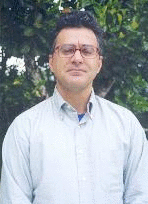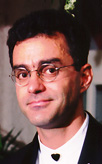Marcelo Viana (IMPA, Brazil)
interviews
Marcus Sarkis
|
 |
| Marcus Sarkis at IMPA, Brazil |
Brain drain has always plagued the developing world, depriving it
of badly needed scientific manpower, as many of their brightest minds
head toward wealthier and more developed areas of the globe in search
for better salaries and better working environments. While it is
unlikely that the situation can be reversed in the near future, some
positive signs are appearing as a result of incentives by several
governments for the return of their national scientists, together with
the emergence of institutes offering highly competitive working
conditions, most notably in countries like China, India, and Brazil.
In order to begin compiling a profile of those scientists who are
coming back, I interviewed Marcus Sarkis, an applied mathematician,
who traded a most promising career in the United States for an equally
promising and even more challenging career in his native Brazil.
Since 2001, Prof. Sarkis is an Associate Professor at the Pure and
Applied Mathematics Institute (Instituto de Matemática Pura e
Aplicada - IMPA) in Rio de Janeiro. Let his own words explain how and
why he got here, and how he feels about it:
MV: Marcus, where are you from and where did you study?
MS: I was born in Rio, but I grew up in several places around
Brazil. Eventually, I went to ITA (Brazil's Aeronautics Institute of
Technology) in São José dos Campos (in the state of
São Paulo), from where I graduated.
MV: At that time, did you feel academically oriented or were you
planning to become an engineer?
MS: From the start, I intended to get a PhD degree and get
involved in research. The atmosphere at ITA and other institutes in
the S. José dos Campos area, like INPE (National Institute for
Space Research), really encouraged that.
MV: Did you envisage research in academia, or rather in
industry?
MS: I was thinking of working at a place like INPE, possibly in
satellite construction, but then came the opportunity to go to
Petrobrás (Brazil's national oil company), where I did a course
in oil engineering, and actually worked for a few months offshore as an
operation leader and production engineer. However, my attraction to
mathematics and my will to do research were stronger, and so I decided
to enroll as a graduate student at the Catholic University of Rio de
Janeiro where I got my Master's degree.
MV: Then it was time to move on to the PhD. Did you plan to go to
the USA from the start?
MS: Well, I knew I wanted to go abroad, but France was actually my
first choice, because I had made some contacts there, in fact I had
visited some institutions there while I was studying for my Master's
degree. But I also applied to the USA and somehow the paperwork went
faster at the Courant Institute. I was accepted there, got my
scholarship from CNPq (Brazil's National Research Agency), and so I
decided to go there.
MV: How was your experience at the Courant Institute?
MS: The first year was tough. My English was not so good, and
therefore, I felt out of place. In the beginning you tend to interact
more with people in the same situation, like Courant colleagues and
other NYU students. Also, there was a lot of pressure because of the
written and oral examinations. But Courant Institute became the place
where I strengthened a great part of my mathematical skills, and also
I learned to appreciate the diversity of cultures present in New York
City.
MV: Who was your thesis advisor?
MS: Initially I worked with Prof. Robert Kohn and I actually took
the oral examination with him. At that point I was focussing on PDEs,
weak solutions, homogenization theory, optimal design, areas like
that. But I began to be more and more interested in Numerical
Analysis, and thus, I changed my advisor to Prof. Olof Widlund, with
whom I did my thesis on finite elements theory and who has become a
good friend.
MV: What was your thesis about?
MS: I focussed on elliptic problems with highly variable,
possibly even discontinuous coefficients. I treated both linear and
non-linear problems, but I guess the fundamental part of my thesis
concerned the linear case. The problem is that after discretization
you get a huge system of equations: you want to have iterative
algorithms for solving this system that can handle those
discontinuities, such that the iteration time be relatively
independent of the coefficients.
MV: In which kind of situations do you find such strongly variable
coefficients that motivate this study?
MS: They appear, for instance, in multi-phase flow on porous media
with highly heterogeneous permeabilities such as those that appear in
petroleum reservoirs. In material science or multi-phase flow
associated to different properties (compressibility, densities,
viscosities and others) or transmission of waves on stratified and
heterogeneous media. For such problems, or in others involving highly
different scales, special discretization schemes and fast and robust
solvers are required. I believe that due to the recent large interest
in MEMS and nanotechnology, and the huge growth of computational
power, such techniques will be required more often.
MV: So, you defended your thesis in 1994. Where did you go
next?
 |
MS: I got a NSF Post-Doctoral Fellowship, which gave me great
freedom to continue doing research. Typically, these fellowships cover
half of your salary, the other half coming from the host
institution. So I went to the University of Colorado at Boulder where
they have a very strong group in Numerical Analysis, both in
Mathematics and in Computer Science with applications especially
related to aerospace sciences. I got very involved in the research
going on there: fluid dynamics, parallel computing, domain
decomposition and so on. I could have stayed there for the rest of my
life! |
| Marcus Sarkis, as a postdoc at the University of
Colorado at Boulder |
MV: Yet, in 2001 you decided to come back to Brazil. Before we get
into that, I would like you to tell me about the grant you were
awarded in 1999.
MS: After Boulder, I moved to Massachusetts for an appointment as
an Assistant Professor at the Worcester Polytechnic Institute. There I
got an NSF Career award. These awards are the most prestigious awards
in the USA for new faculty members. The award recognizes outstanding
new professors who intend to develop academic careers involving both
research and education. It supports projects that stimulate the
discovery process in which the excitement of research and inspired
teaching are integrated within the context of the mission of an
institution.
MV: So when you decided to come back, why did you do it? Was it
for family reasons; did your wife want to come?
MS: Well, family reasons did have some weight because my mother
was not feeling well at the time. But mostly, I wanted to come back
and do my share in Brazil. I always felt a moral obligation to
contribute. Besides, although I was very well integrated into the
research going on in the USA, I also felt that a good part of my
effort was, in some sense, being diluted. The problem was that I was
training students but they were moving to industry and the
commercial job market. These kind of skills, like parallel computation
and so on, are in much need in the market and are very well paid. So,
I felt I was not creating a scientific family, a school in my area,
and I was convinced I could be much more influential here in
Brazil. Especially at IMPA, an institution that I know always attracts
a large number of excellent students, and then disseminates them
across Latin America and other regions.
MV: What about your wife, how did she feel about this move?
MS: When I met my wife Michele she was a PhD student in Hispanic
literature and I was a Post-Doctorate student. We talked of going to
Puerto Rico, where she is from, or coming to Brazil, to be near our
respective relatives. But we ended up lingering in the USA for a
while. In the beginning she was not so enthusiastic about coming here,
and her professional situation is not completely settled yet. But we
are both very happy about being here now.
MV: You and your group have a parallel computer downstairs. What
do you use it for?
MS: A lot of what I do involves domain decomposition techniques,
which are particularly suited for parallel computing. Domain
decomposition algorithms attempt to solve a problem on an entire
domain D by using solutions on subdomains of D. The
subdomain can be chosen small enough to be allocated to individual
processors of a parallel computer. Due to the good localization of
the associated data, well-known sequential and fast algorithms can be
used locally for each subdomain. The proper treatment of interfacing
solutions is the key to the method with a rich mathematical structure
and elegant corresponding analysis. The applications considered are:
porous media flow, visco-elastoplastic materials, theoretical Schwarz
methods, numerical homogenization and computational fluid dynamics in
general.
MV: So, you have students and you have computer facilities at your
disposal. What would you say are the main differences between being
in the USA and here in Brazil?
MS: Well I guess the main negative difference is that there are
fewer resources for research in Brazil; funding of science is still
fairly unstable, and you end up spending a lot of time writing research
proposals to various funding agencies. If I had more money I would
be organizing more conferences here, with my students I would go more
frequently to international conferences, we would have more visitors
and larger computers. On the positive side I immediately see the
quality and motivation of the students. Here, if you want to teach a
really advanced course, you can, while you often cannot do this even
in the best places in the USA. I mean, if I offer an advanced course
here, the students will take it and participate actively. That is a
great opportunity for attracting young people to your area!